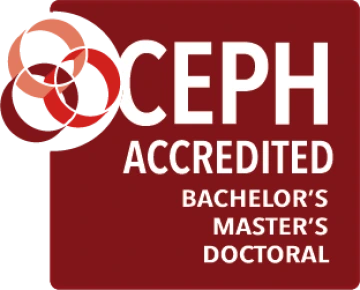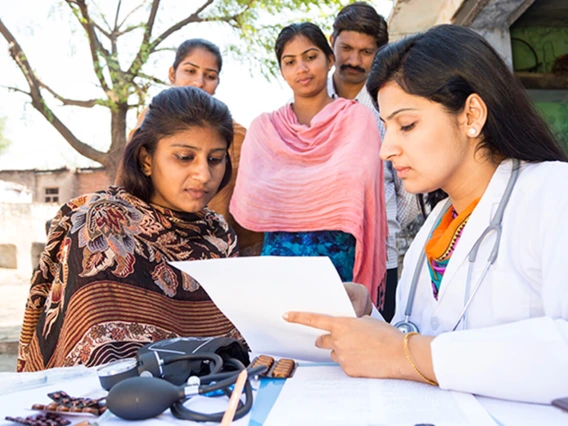Public Health
Master of Public Health
Quick Facts


Top 1%
of all Higher-Ed
Institutions
- Center for World University Rankings, 2024

Realizing that only a healthy population can function and achieve great things, communities have employed different strategies to prevent and respond to health threats for over 600 years. Building on strategies old and new, public health is needed more than ever to respond to infectious and chronic diseases, risk for injury, and unsafe living and working environments. People who choose public health as a career work towards a world where everyone can live, work, learn, and play in safe and healthy environments so they can meet their full potential.
The Master of Public Health (MPH) degree is an interdisciplinary, professional degree. At the Zuckerman College of Public Health, our program has been accredited by the Council on Education for Public Health (CEPH) since 2003. Our program curriculum is guided by CEPH’s MPH competencies and includes a focus on developing knowledge and skills in core areas of public health and in specialized areas or “concentrations.”
The online program offers concentrations reflecting key public health disciplines and focal areas: Applied Epidemiology, Climate Change and Health, Global Health, Health Behavior Health Promotion, Health Services Administration and Population Aging and Long-Term Care. All students also complete an applied practice experience with an organization that allows them to put their skills to work and to real-world needs.
We also offer two dual degree options with the College of Nursing. 1) The Doctor of Nursing Practice (DNP) in the Family Nurse Practitioner specialty with an MPH in Health Behavior-Health Promotion and 2) The MS-DNP in Executive Health Systems Leadership with an MPH in Health Services Administration. Students take courses in both programs each session. These programs only start in the fall semester and have different admission requirements and deadlines.
Applicants interested in these options are advised to consult the College of Nursing first to review eligibility for the DNP program and admission details. Please contact CON-OSAA@arizona.edu (College of Nursing) and coph-onlinemph@arizona.edu (College of Public Health) for more information.
The online program is designed for working professionals and usually takes two years to complete, but alternative timelines can be designed.
Eligibility: Admissions requirements for the MPH program include a bachelor’s degree with a GPA of 3.0 or higher and coursework with a grade of C or higher in math (college algebra, precalculus, or calculus). Applied Epidemiology and Climate Change and Health concentrations also require a human or general biology semester. Please contact us with questions about eligibility.
Why Earn an Online MPH?
Earn a degree that makes a difference, not just in your life and career, but in the well-being of your community. Whether you’re interested in preventing chronic disease, educating underserved communities on healthy behavior, or working to improve health policy, you will graduate with the freedom to choose your own career path.
*Residents of some U.S. Territories may not be eligible. Please see our Eligibility & State Authorization page for more information.
The core curriculum for this degree program includes:
This course reviews the fundamentals of budgeting and financial management. Recent surveys have identified financial management expertise as a key area in of need for the current public health workforce.
This course will introduce students to the basic concepts and principles of epidemiology. Students will learn quantitative skills in data analysis and how to interpret results to address public health problems.
This course explores a range of topics including the roles of public health professionals, public health management processes, health services organization, health policy issues and public health trends.
This course explores how to assess, prevent, and control environmental hazards that present risks to human health and safety. Topics include management and regulatory programs, guidelines, and authorities that control environmental health issues in the United States.
This course introduces biostatistical methods, including descriptive statistics, probability theory, and inferential statistical techniques. These methods are used to make practical conclusions about empirical data. Students will learn to use a statistical software package (STATA).
This course reviews the social, cultural and behavioral determinants of health. Students will examine the direct and indirect role that the conditions in which people live, work and play have on health throughout the lifespan.
Outcomes
Skills
Earning your Master of Public Health in Public Health will build core skills, including:
- Collaboration
- Community engagement
- Cultural competency
- Data analysis
- Leadership
- Policy advocacy
- Policy development
- Program design and evaluation
- Research
- Systems thinking
- Verbal and written communication
Potential Career Paths
Concentrations

This concentration provides systematic training in measuring and studying the distribution and determinants of diseases and health issues in a range of populations. Epidemiology, a fundamental science of public health, focuses on the prevention of both chronic and rare diseases, disability and premature death. Graduates may work in public, non-profit and private health settings gathering, analyzing, interpreting and communicating data to improve health and quality of life.
Examples of courses that you may take include:
This course will review research study designs, assessment of association between disease exposure and outcomes, and issues such as misclassification and bias. Students will apply concepts to survey design and data analysis.
This course is an intermediate course in biostatistical methods and their application in epidemiology and public health. This course covers linear regression analysis, logistic regression analysis, time-to-event (survival) analysis, and study design.
In this course, students will develop practical skills in the investigation of outbreaks, development and implementation of infectious disease surveillance, and the administration of infectious disease control and prevention
In this course, students identify a topic, conduct a literature review, generate research questions and hypotheses, and then use public health data to analyze and interpret quantitative data. They will also explore emerging trends and methodologies in epidemiological research and sources of publicly available data.

This concentration offers a combination of public health and health care administration courses that provide students with a multifaceted understanding of the administrative and business aspects of healthcare. Graduates of this concentration may take leadership roles in working to improve the quality of policies, programs and services offered in healthcare, social service, academic and public health organizations.
Examples of courses that you may take include:
This course provides a foundation in health services administration, Introducing the student to the structure and functions of the US health care system. The health care system is examined within its environment, cultural, economic and other contextual factors to determine how they impact health services administration and how health care systems affect our communities. Students will conduct a community health system analysis.
This course is intended to introduce students to current and foundational issues in law and ethics that impact the policies and practice of public health. The goal of the course is to allow students to identify and appropriately assess legal and ethical issues that underlie the field of public health.
This course will introduce students to the structure of large, complex, health care organizations and illustrate the most important components of administration and management. Topics covered include: U.S. health care system outcomes, financing and administrative structure, regulatory and legal structure, leadership, marketing, ethics, planning, information systems, quality improvement and facilities management. Individual and group assignments are utilized, including presentations, case assessment, discussion and written deliverables.
This course provides an overview of healthcare marketing theories applications to healthcare and public health organizations. Students will work with an NPO to learn about the public health problems addressed. Create a research and data-based, comprehensive strategic or marketing plan to facilitate (including evaluation) to mediate or alleviate this condition. Students may use the opportunity provided by this course to develop a marketing plan for addressing real-life public health problems that are relevant to their current or future work.

This concentration examines the sociocultural factors that influence health and health behavior. The program trains future professionals to plan, implement and evaluate effective policies and programs designed to improve community health and well-being. Graduates work to promote healthier lifestyles, prevent premature death, and fight disease in diverse communities large and small.
Examples of courses that you may take include:
This course focuses on the theory and processes of planning and implementing health education and health promotion programs. The course provides instruction on how to conduct a needs and an asset or strengths-based community assessment; prioritize community health assets and needs; write project objectives that are SMART (specific, measurable, achievable, realistic, and time-bound); select appropriate program designs and how to implement projects.
This course explores a variety of health education and health behavior issues and programs in order to evaluate their impact (or potential impact). Students will read, review, and critique research designed to change behavior via health education and/or health behavior programs.
This course provides learning opportunities for graduate students in the development of competencies related to public health practice among multicultural populations with varying health beliefs, values, behaviors and needs with special emphases on the populations in the state of Arizona.

This concentration prepares students to identify and address key health and human development issues in complex and culturally diverse settings. Graduates learn to develop policies, programs to improve the health and well-being of children and adults in the U.S. and around the world.
Examples of courses that you may take include:
This course examines major global health challenges, programs, and policies. Students will be introduced to multiple determinants of health and disease and will analyze current and emerging global health priorities, including emerging infectious diseases, poverty, conflicts, emergencies, health inequity, health systems reforms, and major initiatives for disease prevention and health promotion.
This course examines historical and current global maternal health policies. Students will explore how these policies are developed, implemented, and responded to by different stakeholders at global and local levels. Skills learned include critical appraisal of maternal health policies in global settings and proposing solutions to problems in policy implementation.
Students in this course will explore the fundamentals of global environmental change with a focus on climate change. Students will develop a better understanding of the pathways through which climate and the environment influence human health; the mechanisms and strategies employed to manage and address these impacts; and the challenges and opportunities facing public health researchers and practitioners alike.
This course presents major nutritional problems that influence the health, survival, and developmental capacity of populations in low-and-middle income countries. It also covers approaches implemented at the household, community, national, and international levels to improve nutritional status. It explores the degree to which malnutrition can be prevented or reduced prior to achieving full economic development through nutrition sensitive and nutrition specific interventions that address the causes of malnutrition.

Offered collaboratively by four Departments in the College of Public Health, this interdisciplinary concentration prepares students to respond to climate-driven health crises. Students learn to identify and address the complex effects of climate change on population health, including ongoing and emergent health challenges in areas of chronic disease, infectious disease, and environmental and mental health. Graduates will develop knowledge and skills in many areas including policy and communication to work in governmental, business and non-profit settings.
Students in this course will explore the fundamentals of global environmental change with a focus on climate change. Students will develop a better understanding of the pathways through which climate and the environment influence human health; the mechanisms and strategies employed to manage and address these impacts; and the challenges and opportunities facing public health researchers and practitioners.
In this course, students will explore the effects of climate and climate change on health. Students begin by learning the fundamental science of climate change and physiology, then move to current and predicted effects of climate change, and finally they explore the framing and communication of climate health impacts. Students produce course deliverables including white papers, peer lectures, and story maps.
In this course, students will explore potential directions for the future of food, influenced by factors such as climate change impacts, the rise of new pathogens and unknown viruses, changing dietary preferences, advancements in technology, the utilization of natural resources, and economic disparities across nations. Students will analyze and evaluate the practicality of recent research and innovations related to food production, processing, preparation, and consumption that aim to promote sustainability within our food system by 2050.
This course introduces a transdisciplinary One Health framework – which focuses on the interconnection between people, animals, and the environment – to examine health drivers and outcomes at local, regional, national, and global levels. Students will learn to articulate, visualize, write, and present complex health issues within a One Health framework

This concentration prepares students to address the growing need for practitioners and leaders who care for and oversee the care of older adults. Students will learn about optimizing the human “healthspan,” developing innovative support strategies, and improving long-term care services in both institutional and community settings. The curriculum emphasizes management and leadership skills for the healthcare and Long Term Care (LTC) workforce, covering clinical and social services, health promotion, education, training, and research within the aging population. Graduates may work in public health, aging services, and long-term care settings, contributing to a healthier and more supportive environment for older adults.
This course explores the relationship between older people and their environment through various lenses, such as physical space (i.e., location) and place (location imbued with individual meaning), private versus public, as contributors versus constraints to a sense of belonging and empowerment for older persons. We will consider how factors such as models of social care, human service practices, public policy, societal attitudes, and environmental design positively or negatively impact the environmental experience of diverse older persons as they age in place. The goal is to consider how environmental design, social interventions, and public policy can support well-being and optimize the lived experience of the aging and aged.
Designed to provide students with practical information about leadership and principles of management necessary for the successful management of long-term care facilities, this course examines management issues in long-term care primarily in the key areas of human resources, public relations, and marketing, creating person-centered care environments, quality improvement,t and culture change, as well as essential skills necessary to manage these issues.
This course explores ways in which we can optimize the aging experience by introducing students to modalities to enrich and revitalize the lived experiences of older adults. Our goal is to learn how to enhance and promote overall well-being in later life, focusing on health, social, and behavioral domains, using a public health perspective. The content of this course is delivered in three modules addressing (1) Aging, Well-being, and Public Health; (2) Aging, Vulnerability, and Emergency and Disaster Preparedness; and (3) Aging, Well-being, and Resilience.
Member of the Association of Schools and
Programs in Public Health (ASPPH)
Dates & Deadlines
The Master of Public Health program offers rolling admissions throughout the year.
Career Outlook
Admissions Process
Step 1:
Determine your Application Pathway: Direct Admission or Selective Admission
If you are a graduate of UA, ASU, or NAU you may be eligible for “Direct Admissions” – a simplified application process. To learn more please visit the College of Public Health.
If you think you may be eligible for Direct Admission, follow the links at the COPH webpage to complete a brief survey. You will be notified by admissions staff if you eligible to apply for Direct Admission.
Step 2:
Direct Admission: Pre-screen Survey and Grad App
If you are notified that you can proceed with the Direct Admissions, you will apply directly to the UA using the Grad App application. You will need to send official transcripts for all colleges/universities attended to the UA, but no letter of recommendation, resume, or personal statement will be needed. There is a $90 fee associated with the Grad App application. See https://apply.grad.arizona.edu
Step 3:
Selective Admission: SOPHAS and Grad App
If you are a graduate of UA, ASU or NAU and are not eligible for Direct Admission OR you are a graduate of another institution in or outside the U.S. you will apply to the COPH through SOPHAS, the online centralized application service for all accredited schools of public health. There is a $160 fee associated with the SOPHAS application. Application materials including transcripts, statement of purpose, resume, and letters of recommendation will be submitted through SOPHAS.
Please send all official U.S. and Canadian transcripts for all colleges/universities attended to:
SOPHAS
PO Box 9111
Watertown, MA 02471
If you are recommended for admission, you should then complete the Grad App and pay the application fee. See https://apply.grad.arizona.edu
Step 4:
International Applicants: Additional Information
All international applicants will apply through SOPHAS and Grad App (See Step 3). International transcripts (not including study abroad transcripts), should be evaluated by the World Evaluation Service at www.wes.org/cas. Please note this process can take several months.
Official language test scores should also be submitted to SOPHAS: TOEFL: SOPHAS code 5688; IELTS: SOPHAS code "SOPHAS"













In this course, students will gain knowledge, skills, and experiences in strategies for supporting the physical and brain health and well-being of the growing older adult population.